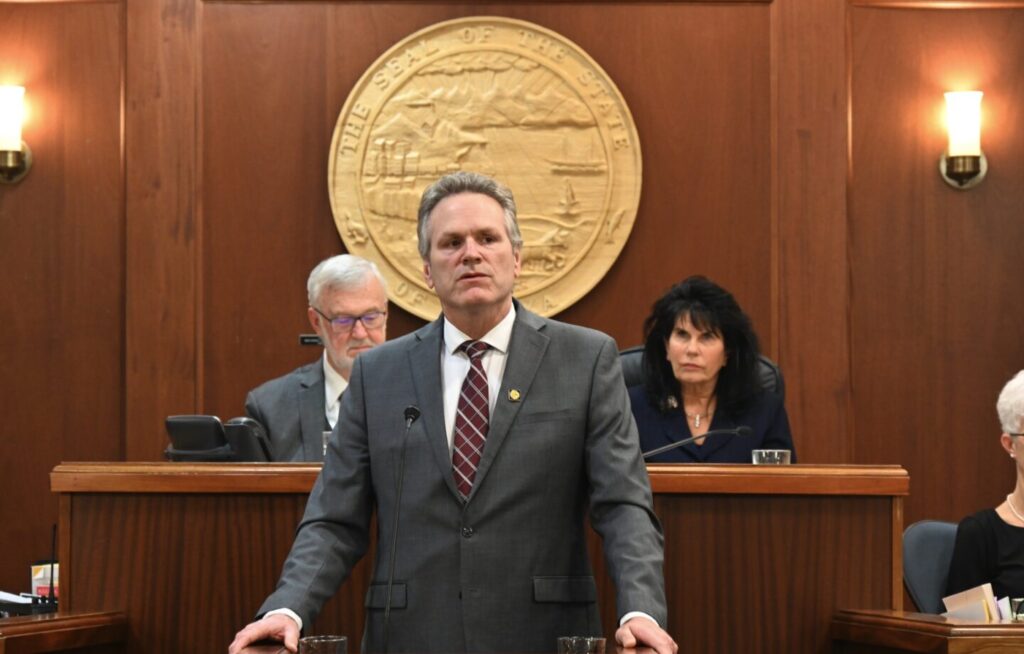Effort to overturn Alaska governor’s veto of ‘half done’ education bill fails
Alaska Gov. Mike Dunleavy’s veto of a bipartisan education bill will stand after legislators failed to gather enough votes to override it.
The bill, overwhelmingly passed in both chambers last…

Alaska Gov. Mike Dunleavy’s veto of a bipartisan education bill will stand after legislators failed to gather enough votes to override it.
The bill, overwhelmingly passed in both chambers last month, would have significantly increased the amount of money Alaska spends on public schools under the state’s spending formula.
The Legislature met in a joint session Monday and fell one vote short of the 40 required to override the veto.
Senate Bill 140 included provisions to increase the amount of per-student funding from $5,960 to $6,640, provide stronger internet service to rural schools, fund new reading improvement plans, establish an appeals process for terminated charter schools, and create a charter school coordinator position.
The $246 million spending bill was passed by a 38-2 vote in the House and an 18-1 vote in the Senate. The legislation would have been the largest school spending increase in Alaska history.
Dunleavy vetoed the education bill Thursday, citing the bill’s lack of meaningful reform.
“Although I SUPPORT an increase to the BSA [Base Student Allocation] – there were no new approaches, other than enhanced funding, to increase educational outcomes. SB 140 lacked sufficient changes in how charter schools are chartered in order to allow more students and families charter school possibilities,” he said in a public statement.
On X, Dunleavy argued that the Legislature got things “half done” and that the bill “falls far short of improving outcomes for students.”
“We need to make sure that we’re addressing the teacher retention issue. We need to make sure that the reading component in the bill … actually incentivizes good outcomes in reading. We need to work on the charter school part so that we can ensure that anybody that wants to attend a charter school can do that … If it’s just going to be about money and nothing else, I’m not interested in having this bill become law.” he said.
Alaska is already ranked 4th in the nation for per-student funding, only behind New York, Connecticut, and New Jersey. However, according to the National Assessment of Educational Progress, Alaska’s mathematics and reading outcomes are some of the lowest in the country.
The state’s teacher shortage is also among the highest in the nation.
Dunleavy had previously advocated for a plan to allow a state board appointed by the governor to approve new charter schools. He also proposed a $180 million three-year teacher retention program that would provide money to schools directly tied to teacher pay.
The governor’s charter school plan was reportedly a “non-starter” for Alaska Democrats. Critics also argued that his teacher-retention proposal was expensive and would not be an effective use of funds.
Senate President Gary Stevens, R-Kodiak, told the Anchorage Daily News that the version of Senate Bill 140 that passed the Legislature was the compromise.
“I think we’ve gone about as far as we can,” he said.
Supporters of SB 140 expressed dismay over the governor’s veto.
The conservative non-profit Americans for Prosperity, however, thanked the Alaskan Legislature for upholding the veto.
“Today’s vote outcome will help Alaska prioritize students over systems and gives the Legislature another shot at bettering Alaska’s education system, by tying education spending to student outcomes,” the organization said in a statement.
After Monday’s vote, Dunleavy said he is still committed to funding Alaska schools.
“I want to thank the Legislature for their hard work and commitment to implementing new education reforms that put Alaska families first,” he posted on X. “Let it be clear to school boards and associations: education funding will be prioritized and available – I support solutions that move us forward.”



